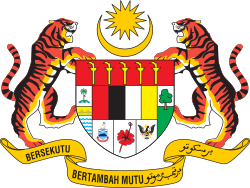Malaysian Unity Movement Parti Perpaduan Anak Malaysia | |
|---|---|
| Abbreviation | MUM |
| Founder | Arthur Lee |
| Founded | 1 February 1986 |
| Legalised | 1 February 1986 |
| Split from | MCA |
| Headquarters | Kuala Lumpur & Petaling Jaya, [1] Malaysia |
| Ideology | Multiracialism |
| Political position | Left-wing |
| Colours | Red |
| Slogan | Chinese unity in national unity |
 |
|---|
Malaysian Unity Movement (abbrev: MUM; Malay: Parti Perpaduan Anak Malaysia) was a multiracial [2] political party in Malaysia. Itsought to represent the Malaysian Chinese ethnicity and was formed by former MCA member, Arthur Lee. [3] [4]